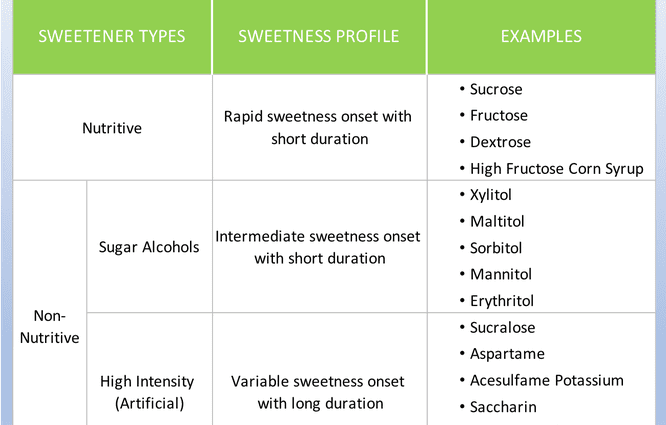In the hope of shedding too much, we refuse sweet tea, buy fructose, but the kilograms do not go away. You can be successful if you know which foods contain sugar and what are sugar substitutes.
The main culprit of overweight is fatty foods. Free sugar also plays its part – glucose, galactose, fructose, sucrose, as well as those naturally found in honey, syrups, fruit juices and their concentrates. It is not necessary to completely abandon them, although the body is perfectly able to extract the glucose it needs from complex carbohydrates, splitting them into simple components during the digestion process. It is its source of energy necessary for the normal flow of all life processes.
But if you use sugar too much, you can earn obesity and caries. WHO recommends a daily rate of 10% of total calories, even better – 5%, approximately 25 grams. This rule does not apply to fresh fruits and vegetables, milk. WHO does not offer an exact formula, but in order to fulfill the prescription, it is enough to give up sugary drinks, fruit juices, ketchup, convenience foods. It is desirable to limit the use of confectionery and granulated sugar or refined sugar to a minimum, and not only for the sake of slimness.
We often do not suspect how much sugar the finished products contain. For example, a tablespoon of ketchup contains approximately one teaspoon of it, in a can of 0,25 ml soda can be up to 10 spoons. The manufacturer, in order to hide it, indicates agave syrup, honey, fructose in the composition – all these are just different types of sugar, and not its substitutes. Often they write “cane sugar”, but it is no more useful than beet sugar. Well, if these ingredients are at the end of the list, it means that there are not many of them in the product, but if at the very beginning – give up the purchase.
… ready-made sauces.
… Instant soups and cereals.
… Semi-finished meat products.
… canned vegetables.
… low-fat dairy products.
… whole grain bread.
… Muesli, fruit bars.
… carbonated drinks labeled zero calories, zero and light.
…sushi.
Certain subcortical structures of the brain are responsible for the feeling of pleasure. It is there that the taste buds give signals when recognizing sweets. Many quietly live without sweets and get glucose from cereals, vegetables, fruits. Those for whom the need is insurmountable can look at the sugar substitutes. They are produced mainly from chemical compounds, and there are natural – from substances of plant origin. They are able to deceive taste buds and make the brain consider it a sweet, sugar-free dish. The only contraindication for their use is pregnancy and breastfeeding.
Now considered the safest natural sweetener. stevia, however, he has a bitterness, which not everyone likes.
Also safe sucralose. It is resistant to heat treatment, so it can be added to hot coffee, and not just cold water.
Permissible to use cyclamate и aspartame. The latter is widely used in the world, but is not recommended for people with phenylketonuria – a rare disease associated with impaired metabolism of amino acids.
Xylitol and sorbitol have been known for a long time, are loved by customers, but they have a calorie content – you should not contact them if you are obese. And remember, sweeteners and sweeteners are not the same thing. The latter include any substances that can give a dish a sweet taste, such as granulated sugar or stevia. That is, any substitute is a sweetener, but not vice versa.










